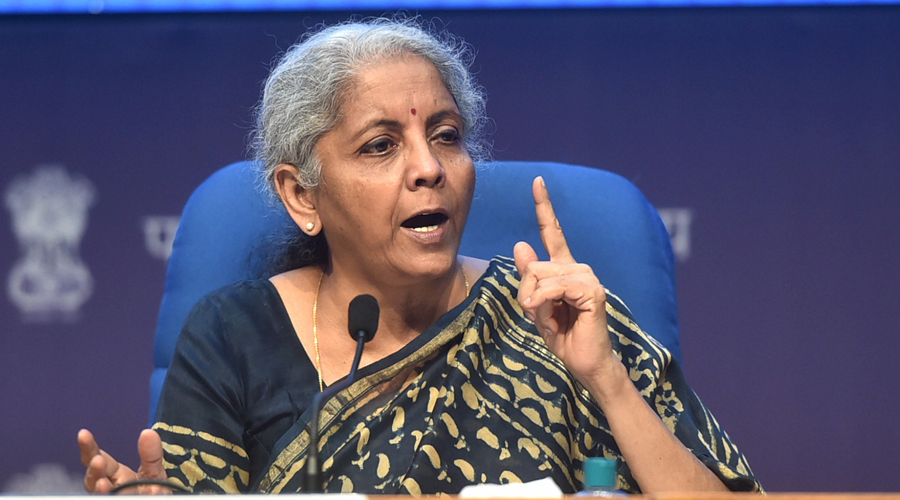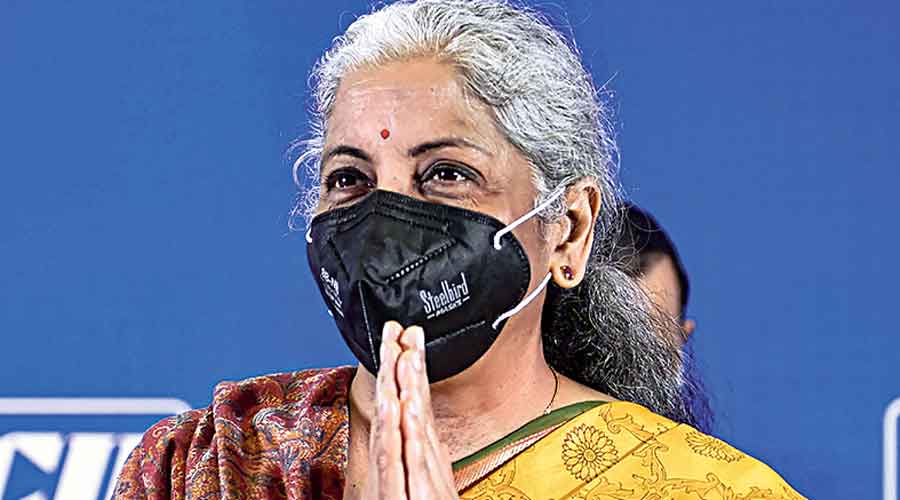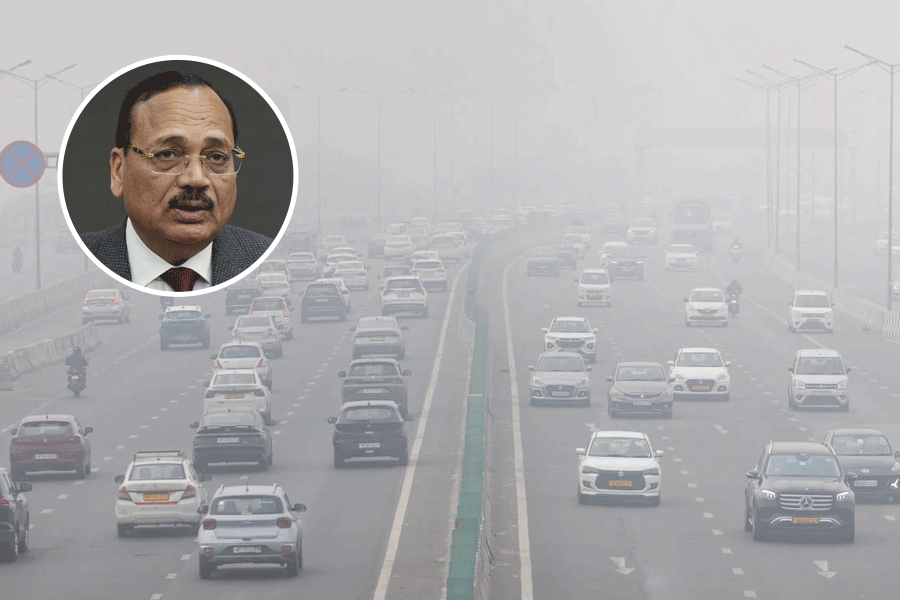The Modi government has spooked industry by placing a gag on the publication of unverified export and import transactions — and threatened to throw a person into prison for six months for doing so.
The clampdown on the dissemination of details pertaining to the quantity and value of individual export and import items has been done through a new provision in the Finance Bill 2022 that was tabled along with the latest budget.
Finance minister Nirmala Sitharaman has introduced a new section – 135AA – in the Customs Act that reads: “If a person publishes any information relating to the value or classification or quantity of goods entered for export from India, or import into India, or the details of the exporter or importer of such goods under this Act, unless required so to do under any law for the time being in force, he shall be punishable with imprisonment for a term which may extend to six months, or with fine which may extend to Rs 50,000, or with both.”
It further clarifies that nothing contained in this section shall apply to any publication made by or on behalf of the central government.
“For the purposes of this section, the expression ‘publishes’ includes reproducing the information in printed or electronic form and making it available for the public,” it added.
It is the sweeping nature of the proviso – with no ostensible room for sharing legitimate business intelligence -- that has left everyone aghast.
The explanatory memorandum of the Finance Bill, 2022 says Section 135AA has been inserted in the Customs Act to “protect the import and export data submitted to Customs by importers or exporters in their declarations by making the publishing of such information unless provided by the law, as an offence under Customs Act.”
Ajay Sahai, director-general of the Federation of Indian Export Organisations (Fieo), told The Telegraph that the “exporters had pitched for stringent measures to prevent commercially sensitive information being shared as they were being procured from the Customs ICEGATE and being sold for a premium. This was impacting the exporters and also the country’s forex earnings.”
The Indian Customs Electronic Gateway (ICEGATE) is the national portal of the Indian Customs under the Central Board of Indirect Taxes and Customs (CBIC). It provides e-filing services to the trade, cargo carriers and other trading partners electronically.
Sahai claimed the section “basically addresses the concern raised by exporters as few private people are publishing commercially sensitive information about exporters/their foreign buyers , price at which goods are exported resulting in unethical competition and cost cutting by other exporters to take the orders thereby depriving the country of better export value. This will not affect the statistical information published by you all as the information published by you is either in public domain or available through source other than Customs ICEGATE. However, the government should clarify to remove any ambiguity,” he added.
So, where lies the ambiguity?
Says Rajat Mohan, senior partner at AMRG & Associates: “On a plain reading, this provision seems to be a double-sided, open-ended sword that would restrict all the media houses, publishers, academicians, historians, and researchers to publish any information related to the import and export of goods. This provision seems to be a restraint on the free flow of information available to the public at large in relation to imports and exports. The objects and reasons for this amendment in the law are ambiguous and unclear.”
Adds Smita Singh, Partner - Indirect Taxes, Customs and Trade Laws, S&A Law Offices: “The intent is to protect commercial information submitted by importer or exporter to the Customs and to avoid the leakage of trade secrets so that competitiveness of industry is protected. Thus, Business Information Service providers who independently source data would not come under the purview of this section as long as the data published has not been obtained from a customs declaration.”
“However, this objective does not flow from a plain reading of the section itself and there could be disputes on the issue as to what will constitute as a punishable offence under this section. So to avoid any further confusion, the CBIC must issue a clarification. Otherwise, this change will have a major impact on Business Information Service providers who publish data relating to imports and exports.”
In its present form, the section appears draconian because it seeks to block independent flow of export import data and chokes off a stream of business intelligence which is the lifeblood for companies. Official trade data comes with a lag and is pretty useless when it comes to gauging trends and formulating business decisions.
“Last year, the government had introduced the CAROTAR provisions which required importers to disclose sensitive pricing information related to imports under the FTA. There was always a fear that this price sensitive information could get leaked into the public domain as other information is available. Section 135AA will deal with such situations of data leakage and protect the business sensitive information of importers and exporters,” Jatin Arora, Partner, Phoenix Legal, said.
CAROTAR stands for Customs (Administration of Rules of Origin under Trade Agreements) Rules. It provides the minimum basic information that the importer needs to know before importing goods. These rules help the importer to ascertain the country of origin, assist customs authorities in the smooth clearance of import of goods under free trade agreements (FTAs) and claim concessional duty.
Shashi Mathews, partner at IndusLaw, says: “The larger issue will be for the trade as such data is used for justifying valuation in transactions between related parties in relation to the Special Valuation Branch, contemporaneous imports value, transfer pricing etc. This Section might affect availability of such data.”
Mathews believes that there should be some amount of ringfencing around sensitive trade data but an outright ban – without clarifying what can be legitimately shared – can prove to be hugely counter productive.
Two aspects emerge from this new section. Firstly, it seems to be targeting transactional level data and not general import export data (which is also published by the Government and thus, protected). Second, this applies to making such information available to the “public”. Therefore, dissemination of such specific data, for example, X person imported so and so goods at so and so value, will be covered by this section.”
“The intention behind introducing such a provision is to protect the confidential import and export data of Indian importers/exporters. In the customs portal, the data relating to export and import can be extracted on the basis of HSN code or Importer Exporter Code (IEC) through a click of button by customs officers. At times, such data could be leaked through middlemen and monetized in the market,” says Gopal Mundhra, partner at Economic Laws Practice.
“Some of the websites publicly claim to provide export/import data of any period for any goods against a fee or subscription. To prevent the unscrupulous use of such published data, the government has taken a positive step by explicitly criminalizing such publications. There is no bar if such data is published by or on behalf of the Central Government or published under any statutory obligation,” Mundhra adds.
The problem is that the Modi government does not bring the same logic when it comes to sourcing financial information about companies from the ministry of corporate affairs (MCA) website. This limits access to information to the public, which is why a huge number of companies are able to make a killing by peddling information on listed and unlisted companies that once used to be available from the registrar of companies for a nominal fee.











